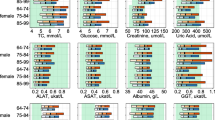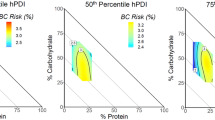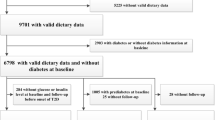Abstract
Objective
This study examined the association of plasma DHA, dietary DHA, and fish intake with dementia and Alzheimer’s Disease (AD) in older adults.
Design
Case-cohort study.
Setting
Clinic visit in 1991–93.
Participants
266 community dwelling men and women aged 67–100 years (mean=80.2).
Measurements
Participants had neurological and neuropsychological evaluations for dementia in 1991–93. Plasma DHA was measured in blood samples obtained at that visit. Dietary intakes of DHA and fish were obtained from an earlier (1988–91) visit. Three DHA exposure variables were used in separate analyses; plasma DHA, dietary DHA, and consumption of cold-water fish. All-cause dementia included AD and other types of possible or probable dementia.
Results
Among these 266 participants, 42 had dementia and 30 had possible or probable AD. Plasma DHA in the highest tertile was associated with a 65% reduced odds of allcause dementia (95% CI: 0.17, 0.92) and a 60% reduced odds of AD (95% CI: 0.15, 1.10). Dietary DHA in the highest tertile was associated with a 73% reduced odds of all-cause dementia (95% CI: 0.09, 0.79) and a 72% reduced odds of AD (95% CI: 0.09, 0.93). Fish intake had similar, though not significant, reduced odds of dementia (OR = 0.51; 95% CI: 0.20, 1.32) and AD (OR = 0.55; 95% CI: 0.20, 1.48).
Conclusions
Plasma and dietary DHA appear to protect against dementia. Increasing DHA intake from marine sources may be recommended for reducing dementia risk.
Similar content being viewed by others
References
2008 Alzheimer’s disease facts and figures. Alzheimers Dement 2008;4:110–133.
Lanska DJ. Dementia mortality in the United States. Results of the 1986 National Mortality Followback Survey. Neurology 1998;50:362–367.
Lee JH, O’Keefe JH, Lavie CJ, Marchioli R, Harris WS. Omega3 fatty acids for cardioprotection. Mayo Clin Proc 2008;83:324–232.
Bergmann C, Sano M. Cardiac risk factors and potential treatments in Alzheimer’s disease. Neurol Res 2006;28:595–604.
Pomponi M, Pomponi M. DHA deficiency and Alzheimer’s disease. Clin Nutr 2008;27:170.
Carriere I, Delcourt C, Lacroux A, Gerber M. Nutrient intake in an elderly population in southern France (POLANUT): deficiency in some vitamins, minerals and omega-3 PUFA. Int J Vitam Nutr Res 2007;77:57–65.
Burdge GC, Calder PC. Conversion of alpha-linolenic acid to longer-chain polyunsaturated fatty acids in human adults. Reprod Nutr Dev 2005;45:581–597.
Brenna JT, Salem N, Jr., Sinclair AJ, Cunnane SC. alpha-Linolenic acid supplementation and conversion to n-3 long-chain polyunsaturated fatty acids in humans. Prostaglandins Leukot Essent Fatty Acids 2009;80:85–91.
Biagi PL, Bordoni A, Hrelia S, Celadon M, Horrobin DF. Gamma-linolenic acid dietary supplementation can reverse the aging influence on rat liver microsome delta 6-desaturase activity. Biochim Biophys Acta 1991;1083:187–192.
Lopez Jimenez JA, Bordoni A, Lorenzini A, Rossi CA, Biagi PL, Hrelia S. Linoleic acid metabolism in primary cultures of adult rat cardiomyocytes is impaired by aging. Biochem Biophys Res Commun 1997;237:142–145.
Connor WE. Importance of n-3 fatty acids in health and disease. Am J Clin Nutr 2000;71:171S–175S.
Yehuda S, Rabinovitz S, Mostofsky DI. Essential fatty acids are mediators of brain biochemistry and cognitive functions. J Neurosci Res 1999;56:565–570.
Das UN. Folic acid and polyunsaturated fatty acids improve cognitive function and prevent depression, dementia, and Alzheimer’s disease-But how and why? Prostaglandins Leukot Essent Fatty Acids 2008;78:11–19.
Yaffe K, Lindquist K, Penninx BW, et al. Inflammatory markers and cognition in well-functioning African-American and white elders. Neurology 2003;61:76–80.
Musiek ES, Brooks JD, Joo M, et al. Electrophilic cyclopentenone neuroprostanes are anti-inflammatory mediators formed from the peroxidation of the omega-3 polyunsaturated fatty acid docosahexaenoic acid. J Biol Chem 2008;283:19927–19935.
Vedin I, Cederholm T, Freund Levi Y, et al. Effects of docosahexaenoic acid-rich n-3 fatty acid supplementation on cytokine release from blood mononuclear leukocytes: the OmegAD study. Am J Clin Nutr 2008;87:1616–1622.
Lopez-Garcia E, Schulze MB, Manson JE, et al. Consumption of (n-3) fatty acids is related to plasma biomarkers of inflammation and endothelial activation in women. J Nutr 2004;134:1806–1811.
Crawford MA. Docosahexaenoic acid in neural signaling systems. Nutr Health 2006;18:263–276.
Jump DB, Botolin D, Wang Y, Xu J, Demeure O, Christian B. Docosahexaenoic acid (DHA) and hepatic gene transcription. Chem Phys Lipids 2008;153:3–13.
Calon F, Cole G. Neuroprotective action of omega-3 polyunsaturated fatty acids against neurodegenerative diseases: evidence from animal studies. Prostaglandins Leukot Essent Fatty Acids 2007;77:287–293.
Barberger-Gateau P, Letenneur L, Deschamps V, Peres K, Dartigues JF, Renaud S. Fish, meat, and risk of dementia: cohort study. Bmj 2002;325:932–933.
Morris MC, Evans DA, Bienias JL, et al. Consumption of fish and n-3 fatty acids and risk of incident Alzheimer disease. Arch Neurol 2003;60:940–946.
Schaefer EJ, Bongard V, Beiser AS, et al. Plasma phosphatidylcholine docosahexaenoic acid content and risk of dementia and Alzheimer disease: the Framingham Heart Study. Arch Neurol 2006;63:1545–1550.
Engelhart MJ, Geerlings MI, Ruitenberg A, et al. Diet and risk of dementia: Does fat matter? The Rotterdam Study. Neurology 2002;59:1915–1921.
Conquer JA, Tierney MC, Zecevic J, Bettger WJ, Fisher RH. Fatty acid analysis of blood plasma of patients with Alzheimer’s disease, other types of dementia, and cognitive impairment. Lipids 2000;35:1305–1312.
Corrigan FM, Horrobin DF, Skinner ER, Besson JA, Cooper MB. Abnormal content of n-6 and n-3 long-chain unsaturated fatty acids in the phosphoglycerides and cholesterol esters of parahippocampal cortex from Alzheimer’s disease patients and its relationship to acetyl CoA content. Int J Biochem Cell Biol 1998;30:197–207.
Wang W, Shinto L, Connor WE, Quinn JF. Nutritional biomarkers in Alzheimer’s disease: the association between carotenoids, n-3 fatty acids, and dementia severity. J Alzheimers Dis 2008;13:31–38.
Tully AM, Roche HM, Doyle R, et al. Low serum cholesteryl ester-docosahexaenoic acid levels in Alzheimer’s disease: a case-control study. Br J Nutr 2003;89:483–489.
Laurin D, Verreault R, Lindsay J, Dewailly E, Holub BJ. Omega-3 fatty acids and risk of cognitive impairment and dementia. J Alzheimers Dis 2003;5:315–322.
Samieri C, Feart C, Letenneur L, et al. Low plasma eicosapentaenoic acid and depressive symptomatology are independent predictors of dementia risk. Am J Clin Nutr 2008;88:714–721.
Cherubini A, Andres-Lacueva C, Martin A, et al. Low plasma N-3 fatty acids and dementia in older persons: the InCHIANTI study. J Gerontol A Biol Sci Med Sci 2007;62:1120–1126.
Criqui MH, Barrett-Connor E, Austin M. Differences between respondents and non-respondents in a population-based cardiovascular disease study. Am J Epidemiol 1978;108:367–372.
Willett WC, Sampson L, Stampfer MJ, et al. Reproducibility and validity of a semiquantitative food frequency questionnaire. Am J Epidemiol 1985;122:51–65.
Folstein MF, Folstein SE, McHugh PR. "Mini-mental state". A practical method for grading the cognitive state of patients for the clinician. J Psychiatr Res 1975;12:189–198.
Tombaugh TN, McIntyre NJ. The mini-mental state examination: a comprehensive review. J Am Geriatr Soc 1992;40:922–935.
Wiederholt WC, Cahn D, Butters NM, Salmon DP, Kritz-Silverstein D, Barrett-Connor E. Effects of age, gender and education on selected neuropsychological tests in an elderly community cohort. J Am Geriatr Soc 1993;41:639–647.
Reitan R. Validity of the Trail-Making Test as an indicator of organic brain disease. Percept Mot Skills 1958;8:271–276.
Russell E. A multiple scoring method for the assessment of complex memory functions. J Consult Clin Psychol 1975;43:800–809.
Weschler D. A standardized memory scale for clinical use. J Psychol 1945;19:87–95.
Borkowski J, Benton, AL, Spreen, O. Word fluency and brain damage. Neuropsychologia 1967;5:135–140.
Buschke H, Fuld PA. Evaluating storage, retention, and retrieval in disordered memory and learning. Neurology 1974;24:1019–1025.
Frank R, Wiederholt WC, Kritz-Silverstein D, Salmon DP, Barrett-Connor E. Effects of sequential neuropsychological testing of an elderly community-based sample. Neruoepidemiology 1996;15:257–268.
The hypertension detection and follow-up program: Hypertension detection and follow-up program cooperative group. Prev Med 1976;5:207–215.
McKhann G, Drachman D, Folstein M, Katzman R, Price D, Stadlan EM. Clinical diagnosis of Alzheimer’s disease: report of the NINCDS-ADRDA Work Group under the auspices of Department of Health and Human Services Task Force on Alzheimer’s Disease. Neurology 1984;34:939–944.
Folch J, Lees M, Sloane Stanley GH. A simple method for the isolation and purification of total lipides from animal tissues. J Biol Chem 1957;226:497–509.
Arterburn LM, Oken HA, Hoffman JP, et al. Bioequivalence of Docosahexaenoic acid from different algal oils in capsules and in a DHA-fortified food. Lipids 2007;42:1011–1024.
Zeleniuch-Jacquotte A, Chajès V, Van Kappel AL, Riboli E,, Toniolo P. Reliability of fatty acid composition in human serum phospholipids. Eur J Clin Nutr 2000;54:367–372.
Hunter DJ, Rimm EB, Sacks FM, et al. Comparison of measures of fatty acid intake by subcutaneous fat aspirate, food frequency questionnaire, and diet records in a freeliving population of US men. Am J Epidemiol 1992;135:418–427.
Garland M, Sacks FM, Colditz GA, et al. The relation between dietary intake and adipose tissue composition of selected fatty acids in US women. Am J Clin Nutr 1998;67:25–30.
Siest G, Pillot T, Regis-Bailly A, et al. Apolipoprotein E: an important gene and protein to follow in laboratory medicine. Clin Chem 1995;41:1068–1086.
Soderberg M, Edlund C, Kristensson K, Dallner G. Fatty acid composition of brain phospholipids in aging and in Alzheimer’s disease. Lipids 1991;26:421–425.
Kalmijn S, Launer LJ, Ott A, Witteman JC, Hofman A, Breteler MM. Dietary fat intake and the risk of incident dementia in the Rotterdam Study. Ann Neurol 1997;42:776–782.
Huang TL, Zandi PP, Tucker KL, et al. Benefits of fatty fish on dementia risk are stronger for those without APOE epsilon4. Neurology 2005;65:1409–1414.
Welch AA, Bingham SA, Ive J, et al. Dietary fish intake and plasma phospholipid n-3 polyunsaturated fatty acid concentrations in men and women in the European Prospective Investigation into Cancer-Norfolk United Kingdom cohort. Am J Clin Nutr 2006;84:1330–1339.
Harris WS, Mozaffarian D, Lefevre M, et al. Towards establishing dietary reference intakes for eicosapentaenoic and docosahexaenoic acids. J Nutr 2009;139:804S–819S.
Author information
Authors and Affiliations
Corresponding author
Rights and permissions
About this article
Cite this article
Lopez, L.B., Kritz-Silverstein, D. & Barrett-Connor, E. HIgh dietary and plasma levels of the omega-3 fatty acid docosahexaenoic acid are associated with decreased dementia risk: the rancho bernardo study. J Nutr Health Aging 15, 25–31 (2011). https://doi.org/10.1007/s12603-011-0009-5
Received:
Accepted:
Published:
Issue Date:
DOI: https://doi.org/10.1007/s12603-011-0009-5




